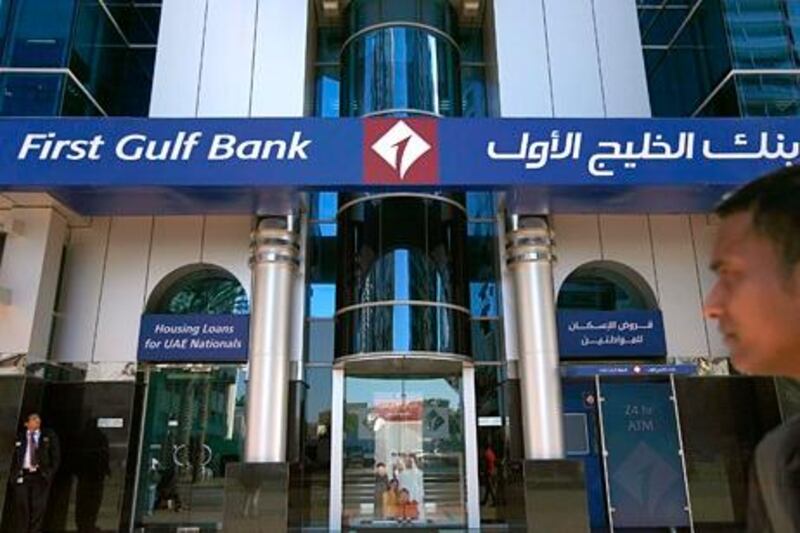First Gulf Bank said first-quarter profits broke the Dh1 billion barrier as banks capitalised from the trickle-down of increased government spending.
The Abu Dhabi-based bank, the country's second-biggest lender by market value, reported a 12 per cent rise in first quarter earnings to Dh1.04bn.
"We have started seeing more efficiency from government authorities to speed up the cycle of payments," said Andre Sayegh, FGB's chief executive.
"If they pay Dh1 every 360 days, the impact is Dh1 per year to the economy. If Dh1 is paid every 30 days, the impact is Dh12 to the economy. That liquidity has started showing up and making its way to the banking sector."
In January Abu Dhabi's Executive Council unveiled plans to develop new homes, roads and other vital infrastructure projects, with a projected budget of Dh330bn over the next five years.
"These are no longer luxury projects," Mr Sayegh said. "The country needs education, schools. Infrastructure is no longer just a passive way of doing business, but an active way that will attract a lot of companies to come to the UAE and create jobs."
First Gulf Bank last month repaid its Dh4.5bn debt owed to the Ministry of Finance that it had received as support following the global financial crisis. The payment came as non-performing loans during the first quarter declined to 3.2 per cent, from 3.3 per cent last year.
"The worst is behind us in terms of asset quality," Mr Sayegh said "The economy of the UAE is improving. Dubai is recovering, and hence we are seeing an improvement in the banking sector."
Customers' deposits have declined from Dh119.3bn to Dh119.15bn as part of "active management of the balance sheet", Mr Sayegh said.
"There is a slowdown on deposit-taking, but it's being done on purpose. If we see there are expensive deposits, we don't take them. The bank is very liquid, but cannot be over-liquid."
Lenders have published strong profits in the first quarter so far. National Bank of Abu Dhabi reported a year-on-year rise of 36 per cent, while Emirates NBD said its bottom line had increased 31 per cent.
The results have boosted confidence for equity investors and values in the stock market.
The Abu Dhabi Securities Exchange General Index is up 24.6 per cent so far this year, trading at 3,279.94 points, while the Dubai Financial Market General Index has risen 29.5 per cent to 2,101.45. Shares of First Gulf Bank have jumped 30.6 per cent since January. The stock slipped 0.3 per cent to Dh15.15 yesterday.
The bank plans to expand its international presence and build up its Asia hub. FGB has branches in Singapore and Hong Kong, as well as a representative office in India.
"Clearly we follow the dynamics of the UAE economy," Mr Sayegh said. "In terms of expansion it's clearly going East. There is a lot of trade between the UAE and Asia."
First Gulf Bank responded to interest by upgrading its wealth management offering, where products range from investments in managed funds to notes, to a full-fledged private banking service.
"We live in an area of wealth, and you need someone to take care of it," Mr Sayegh said. "Many customers that would like to deal with solid banks, like ours, and deal with professionals that are really on the ground."
The bank is also eyeing opportunities to grow its Libyan unit, as policymakers build up institutions amid plans to kick-start the oil-rich economy.
FGB halted operations Libya in 2011 to comply with United Nations sanctions amid a popular uprising demanding the removal from power of Muammar Qaddafi.
"Libya has billions to be spent on infrastructure," Mr Sayegh said. "So we have to be ready and are very well placed to take advantage of it. We are attracting a lot of international names who are going to Libya and want to deal with an international bank already present there."
This article has been altered to correct the quote: "If they pay Dh1 every 360 days, the impact is Dh1 per year to the economy. If Dh1 is paid every 30 days, the impact is Dh12 to the economy. That liquidity has started showing up and making its way to the banking sector."





